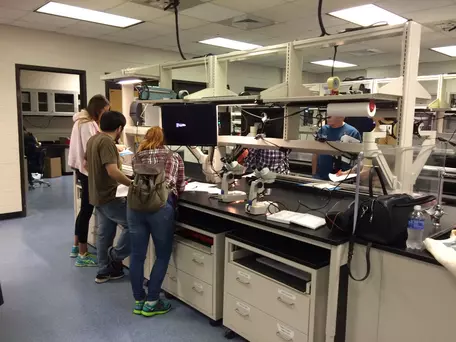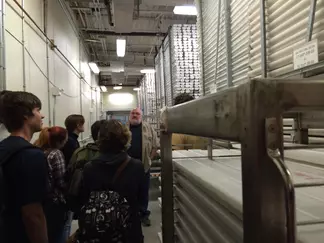GP-EXTRA: Engaging and Retaining Students in the Geosciences at Two-year Colleges (2YC) through Undergraduate Research
Kusali Gamage, Austin Community College (PI)
Hugh Daigle, University of Texas at Austin (Co-PI)
Leslie Davis, Austin Community College (Co-PI)
Chammi Miller, University of Texas at Austin (Co-PI)
Katerina Petronotis, Texas A&M University (Co-PI)
Short Description
The goals of this project are to develop and implement 1) a field activity that allows propagation of research into existing introductory geology courses and 2) a Summer Undergraduate Research Experience Course (SUREC) at Austin Community College. This project targets both non-science and science majors including underrepresented minorities in the first two-years of their post-secondary education.
Context
Austin Community College (ACC) is a public two-year college that offers degrees and certificates in more than 100 areas of study including sciences, engineering, education, humanities and the arts. In 2014, a total of 1,278 students were enrolled in geology courses at ACC. The department offers seven courses including physical geology, historical geology, environmental geology, oceanography and natural hazards. Five of these courses meet general education requirements. As in many geoscience programs in the nation, many students encounter geoscience for the first time in these introductory courses, making the first courses of strategic importance to the department. Currently none of the geosciences courses are included in any formal articulation agreements with four-year colleges or universities though many of the geosciences courses are transferrable to colleges that have equivalent courses or as a general science elective course. The articulation process requires a high level of collaboration and coordination that, to date, has not occurred institutionally in the area of geoscience.
In order to improve the system of geoscience support for students at ACC and beyond, institutions involved with this project include The University of Texas at Austin (UT) and Texas A&M University (TAMU) in College Station. The role of these institutions will be to provide facilities and personnel to increase support and mentorship throughout the grant. In particular, ACC will depend on the facilities and expertise of the Department of Petroleum and Geosystems Engineering Department (PGE) at UT and the Gulf Coast Repository (GCR) at the International Ocean Discovery Program (IODP) at TAMU.
The partnership with these institutions will also enable ACC students to experience a four-year research environment. Mentoring and guidance of faculty members at each institution will encourage students to continue their education beyond an associate's degree and make a successful transfer to a four-year college. The partnerships will enable two-year and four-year college faculty to work with students to develop new research projects. This collaborative work will also allow graduate students to train community college students on how to use specific lab instrumentation and equipment for their research projects.
Goals

- Improved STEM instructional practices
- Increased student engagement in geosciences
- Increased student knowledge of geoscience and STEM careers
- Increased number and diversity of geoscience students
- Improved retention of students in the geoscience pipeline
Activities
The Gulf Coast Repository field activity is open to science and non-science majors enrolled in the currently existing Introduction to Oceanography (GEOL 1445) and a selected section of Natural Hazards & Disasters (GEOL 1301) courses. The field activity will take place at the Gulf Coast Repository located at Texas A&M University. This activity will expose students to scientific research and career opportunities available in geosciences. The goals of field activity are:
- To promote student understanding of science as inquiry;
- To elevate interest in and attract students from non-science fields and other STEM fields;
- To create awareness of career opportunities available in the field of geoscience;
- To help students envision the pathway they can follow from two-year college to a career in geology;
- To encourage students to apply for SUREC;
- To boost academic self-efficacy and commitment.

- To promote student understanding of science as inquiry
- To provide cutting edge undergraduate research experiences during the second year
- To attract and retain undergraduate students in geosciences
- To increase transfer rates of ACC geology students to four-year institutions
- To become part of a learning community, including building strong student relationships
- To boost academic self-efficacy and commitment
Theory of Change
This project is an innovative plan to first hook the incoming undergraduate students using the field activity and then to engage them in authentic inquiry based learning. By enhancing the practice and understanding of science education at two-year colleges, the project has the potential to transform the way we teach introductory science courses at ACC and other undergraduate institutions. We expect that a successful project will provide a model for integrating research into undergraduate education within the Department of Earth and Environmental Sciences at ACC and at Earth Science departments at other institutions. The strategies used in the project can be adapted to 1) focus on other research topics local to a specific area, 2) increase development of a diverse workforce, 3) increase partnerships between academic institutions, and 4) engagement of students in STEM positions present in the region.
The activities designed will provide a unique opportunity for students at ACC to take part in an international science program, which is currently a rare opportunity for 2YC students. Students will be exposed to the excitement of scientific ocean drilling research and the variety of job opportunities available in the field. The SUREC program will provide a more intense research experience with the help of a strong mentoring program. The training provided by the SUREC program will benefit students interested in joining the environmental and petroleum industry workforce.
Instruments and Measures of Success

Data will be collected through a variety of tools including surveys (Lopatto's Classroom Undergraduate Research Experience [CURE], Liang's Student Understanding of Science and Scientific Inquiry [SUSSI], and a survey to be developed for field activity students), knowledge tests, institutional research data, faculty assessment of student performance and skills, faculty interviews, and a review of student projects, as well as project data and annual reports. Input will be collected from students and faculty. The CURE and SUSSI surveys will be delivered through an online student assessment system built for the Community College Undergraduate Research Initiative (CCURI). Pre- and post-surveys will be administered simultaneously to both students enrolled in the natural hazards course without the field activity and well as to those students enrolled in the hazards course which includes the field activity. The following table illustrates examples of how the evaluation tools are tied to some of the project learning objectives and field activities.
This work is supported by a grant from the National Science Foundation GeoPaths program, grant 1600177.
![[creative commons]](/images/creativecommons_16.png)
